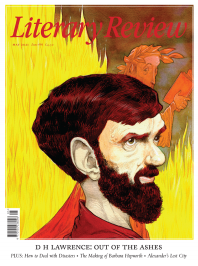Kieran Setiya
Generation Next
Infinitely Full of Hope: Fatherhood and the Future in an Age of Crisis and Disaster
By Tom Whyman
Repeater Books 218pp £10.99
The cover of this book sports a funky riff on Paul Klee’s painting Angelus Novus, which has been reimagined as a colourful line drawing of an adult holding hands with a child. The figure in Klee’s painting is notorious as the ‘angel of history’ invoked by the German thinker Walter Benjamin, its face ‘turned towards the past’, where it sees ‘one single catastrophe, which keeps piling wreckage upon wreckage’ at its feet. Blown backwards by the storm we call ‘progress’, the angel is unable to stop and reassemble the debris.
The cover version is an apt emblem of the philosopher Tom Whyman’s delightfully dissonant attempt to integrate his ‘intellectual goth phase’ – an allegiance to the social criticism of the Frankfurt School of which Benjamin was a part – with his new identity as a doting father-to-be. The book begins with an ecstatic address to the ultrasound of an unborn child and ends with a difficult birth. In between we get a rich introduction to the philosophy of hope and to the ideas of critical theorists like Theodor Adorno and Herbert Marcuse. Benjamin pops up along the way, as do Hannah Arendt and Simone de Beauvoir.
Having a child is an expression of hope, if only for a world in which that child might be glad to live. Whyman’s question is whether that hope is justified now in the face of political uncertainty and the gathering storm of climate change. Whyman’s heroes Adorno and Benjamin are

Sign Up to our newsletter
Receive free articles, highlights from the archive, news, details of prizes, and much more.@Lit_Review
Follow Literary Review on Twitter
Twitter Feed
Princess Diana was adored and scorned, idolised, canonised and chastised.
Why, asks @NshShulman, was everyone mad about Diana?
Find out in the May issue of Literary Review, out now.
Literary Review - For People Who Devour Books
In the Current Issue: Nicola Shulman on Princess Diana * Sophie Oliver on Gertrude Stein * Costica Bradatan on P...
literaryreview.co.uk
Under its longest-serving editor, Graydon Carter, Vanity Fair was that rare thing – a New York society magazine that published serious journalism.
@PeterPeteryork looks at what Carter got right.
Peter York - Deluxe Editions
Peter York: Deluxe Editions - When the Going Was Good: An Editor’s Adventures During the Last Golden Age of Magazines by Graydon Carter
literaryreview.co.uk
Henry James returned to America in 1904 with three objectives: to see his brother William, to deliver a series of lectures on Balzac, and to gather material for a pair of books about modern America.
Peter Rose follows James out west.
Peter Rose - The Restless Analyst
Peter Rose: The Restless Analyst - Henry James Comes Home: Rediscovering America in the Gilded Age by Peter Brooks...
literaryreview.co.uk